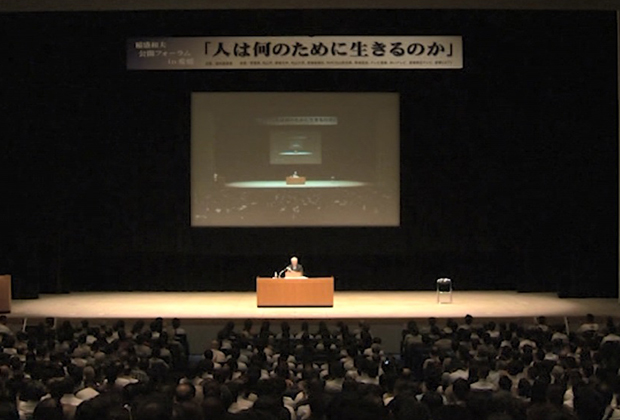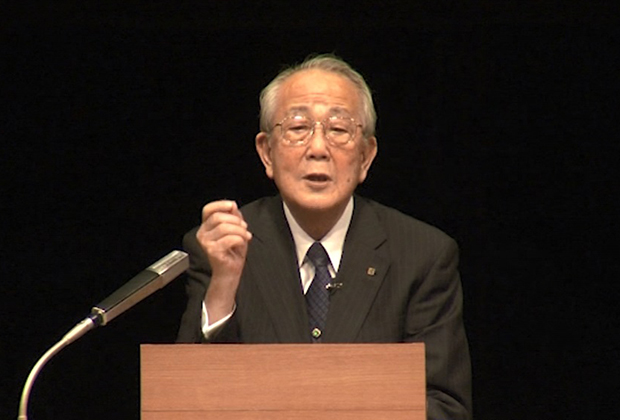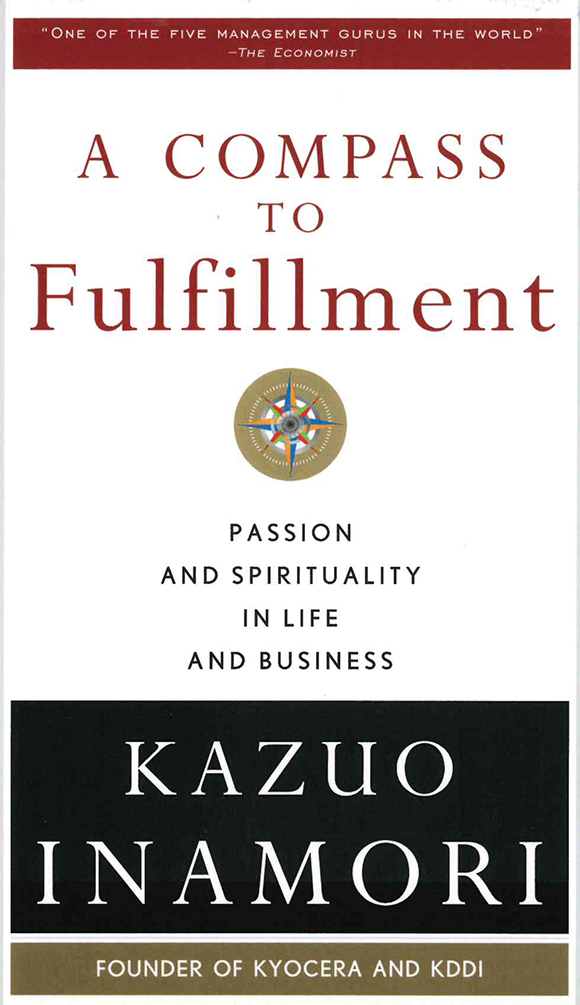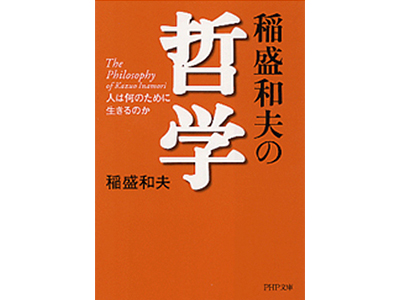Lectures
What is the Purpose of Life?

While leading Kyocera and other companies, Inamori reflected constantly, asking himself, "What is the purpose of life?"
This section introduces part of a lecture Inamori gave on this theme during a Civic Forum* organized by Seiwajyuku in Japan's Ehime Prefecture in August 2014.
*Civic Forum:
Starting in 2002, from his earnest desire to help people advance and better themselves, Inamori lectured on his personal philosophy of life. These civic forums were conducted not only for Seiwajyuku students, but for the general public as well. The forums were held mainly in Japan, with a total audience of more than 100,000 attendees. Inamori gave this lecture to about 3,000 people, mainly Ehime citizens.
Video from the Lecture
Good Thoughts Bring Good Results
(Excerpt from the lecture / 2:59)
Contemplate virtue, do good deeds, and your life will turn for the better
As I struggled to run a business, I continually asked myself, "What is life really about?" In time, I began to see our lives as following a pre-destined path we can equate to the warp thread running lengthwise through a cloth, from top to bottom. Meanwhile, the Law of Cause & Effect is represented by the weft thread travelling from side to side. If we continually contemplate what is good and right, and act accordingly, then positive effects will emerge. In contrast, if we let our thoughts turn toward negativity or evil, and act accordingly, then negative effects will emerge.
My belief in the Law of Cause & Effect stems from an encounter with Unmei to Ritsumei [Fate and Establishing One's Destiny], a book authored by Masahiro Yasuoka, a Confucian scholar who has influenced many Japanese politicians and economists. This book introduces concepts from another book, Liaofan's Four Lessons, written by Yuan Liaofan during China's Ming dynasty. While he was still a small child, Liaofan, who was then known as Xuehai, had his future foretold by an elderly, white-haired oracle. According to this sage, Xuehai was destined to pass the civil service examination, become a regional governor at a young age, marry but have no children, and complete his allotted lifespan at the age of 53. Xuehai's life then began to follow the path described by the old man right down to the details, including which exam he would take, at what age, his passing grade and rank among a certain number of classmates, and so on. Later, as governor appointed to a particular region, Xuehai visited the Zen temple of master Yungu, a renowned Zen priest. Master Yungu had sharp words for Xuehai, who had resigned himself indifferently to living out his life as predestined. Yungu explained that if you commit yourself to thinking good thoughts and undertaking good deeds, then you can change your destiny for the better. Xuehai was open-minded, and he and his wife then determined to think good thoughts whenever possible, and to follow those thoughts with corresponding deeds. Consequently, they were blessed with a son they had been told would never be born. Further, despite having been told his allotted lifespan would be only 53 years, Xuehai was still alive and well past the age of 70.
I came across this book just when my life was at a point where I could not see beyond the immediate future, and I was greatly troubled by how I should proceed. From that encounter, I began thinking about living a life that involved contemplating virtue and undertaking good deeds.
Contemplating virtue harmonizes with the "Will of the Universe," which creates and enhances all things
However, thinking about it was one thing. I had graduated from a science and technology course at my university. As an engineer involved in researching and developing ceramics, I leaned toward logical, argumentative thinking. This made it very difficult for me to believe in the Law of Cause & Effect whole-heartedly. It was around that time when I heard an astrophysicist give a presentation on the theory of the creation of the universe.
Starting from a collection of particles, the universe has continued to grow without a moment's pause for 13.7 billion years, resulting in the creation and development of higher organisms such as humankind. Listening to that talk on the creation of the universe, I became a firm believer in the existence of the Law of Cause & Effect.
A love that has compassion for all things and gently nurtures them permeates everything. Rephrasing, I might go so far as to say there is a " will of the universe" that loves all things in this universe, and tries to turn matters in a better direction. We human beings are living in a universe that continually points all things in nature in a better direction, and endeavors to advance happiness in life. If you or I embrace the same righteous direction as the universe, and act accordingly, then our destiny will almost certainly turn for the better.
My life improved by adhering to the Law of Cause & Effect
As we live our lives, nature presents us with various trials. Sometimes they appear in the form of disaster or misfortune; at other times, they may emerge as good fortune. How you respond to those trials determines the path of your life thereafter. I decided that, whatever misfortune I might encounter, I would accept it as a trial, maintain a positive attitude, and continue to live earnestly and cheerfully.
Thinking about it, my life had been an ongoing series of misfortunes from university graduation right through my absorption in research at Shofu Industrial. Twice I failed the entrance exams for junior high school under the old system. Tuberculosis could have ended my life. I could not gain admission into the university of my choice. I could not take the employment examinations of any leading companies. The company that finally did take me in was ragged, teetering on the edge of bankruptcy. I became deeply resentful and bitter about all the misfortune I perceived as raining down upon me, and took to complaining and venting about the unfairness of it all. Finally, in a desperate effort to shake it all off, I began to bury myself in researching fine ceramics. From that point onward, I began to see wonderful research results that pleased other people. In other words, my destiny began to change for the better. Kyocera, the company I later founded, and subsequently KDDI, enjoyed steady growth and development.
I firmly believe that a life lived in accordance with the Law of Cause & Effect enabled these outcomes.
The true factors behind reconstruction of Japan Airlines

There is another example. During my involvement in the reconstruction of Japan Airlines, the pure and single-minded desire to show "compassion for others" wielded tremendous power. Not only did it rescue a failed corporation, it transformed that corporation into a high-profit enterprise. I cannot help thinking that the reconstruction of Japan Airlines, too, is a result of efforts to contemplate virtue and do good deeds accordingly.
Shortly after I took the post of JAL chairman, I announced to all employees, "The purpose of management at the newly reborn Japan Airlines is to provide opportunities for the material and intellectual growth of all our employees." I pushed this point repeatedly, and presented my unshakeable conviction to employees: "From here on, the corporation known as Japan Airlines exists not for the benefit of shareholders, and certainly not for the self-interest of its managers, but for the growth of all employees who comprise this company." My personal belief, my management philosophy, was subsequently woven into the management philosophy of the newborn Japan Airlines. Furthermore, I explained to JAL's management and employees the thinking underlying my philosophy of life and business, the Kyocera Philosophy.
Meanwhile, to break down the established bureaucracy of Japan Airlines, I implemented a reorganization to clarify a system of responsibility. This was followed by constructing a management accounting system to raise profit awareness.
Certainly, these various reforms contributed greatly to JAL's reconstruction. However, I feel the true factor behind the dramatic revival of Japan Airlines comes from my earnest desire to "do good." Picking myself up and shaking out these old bones, I undertook the reconstruction of Japan Airlines with no salary, to support the revival of Japan's economy, to safeguard the employment of the remaining JAL employees, and for the Japanese people. JAL employees developed a similar mindset and put all they had into the reconstruction. Perhaps, seeing this ongoing effort, driven solely by altruistic thinking, the Divine or heaven took pity and stretched out a helping hand.
While this is not the Law of Cause & Effect as such, I cannot help but think we received a helping hand from a source of universal compassion. I doubt whether such a miraculous recovery and transformation could have been achieved without "Divine intervention."
The goal of life is to refine the soul
Regardless of how we have lived our lives to this day, and regardless of personal will, our lives have been woven into the fabric of destiny and the Law of Cause & Effect. Amid these circumstances, in my view, our goal should be to refine ourselves, and to develop a purer mind and a purer soul.
To refine the mind is to refine the soul. Rephrasing, refining the mind raises personal character. The result is an enrichment of human nature, and the creation of a more pure humanity. My wish, for when the end of life approaches, is to have raised my soul into something even just a little more pure than it was at the time of my birth, to have a pure mind filled with kindness and consideration.
However, despite the desire to refine the mind in this manner, the truth is that human beings have a lot of difficulty putting this concept into practice. Nevertheless, I believe that even the mere action one takes to raise one's character, to turn one's mind and soul into something higher through repeated effort, is itself something to be esteemed.
Notable Quotes from This Lecture
Here are some excerpts from what Inamori expressed in this lecture.
There's a vertical thread [in our lives] called destiny and a horizontal thread named the Law of Cause & Effect. These two threads weave together to shape each person's life. This has been my belief.
We humans live in a universe that continually pushes everything toward a better and happier direction. Thus, when we hold and act upon benevolent intentions that resonate with this universe, our destinies should inevitably change for the better.
Whether faced with fortune or misfortune, how we respond can alter the course of our lives. I've always believed that 'No matter the circumstance, be it disaster or blessing, one should embrace things with a heart of gratitude.'
Recently, I've come to believe that perhaps the real driving factor behind the dramatic turnaround of Japan Airlines was the sheer determination to 'do good.'
In the dojo [school] of life, I hope you strive to think and do good. You'll be polishing your soul and heart by doing so, and with that beautifully polished heart, the visions you paint should undoubtedly transform your life into something wonderful.
Ehime Civic Forum (August 6, 2014) Summary

